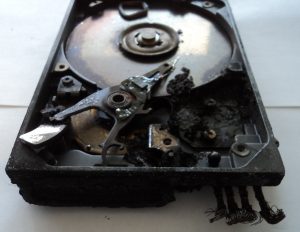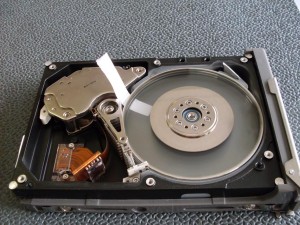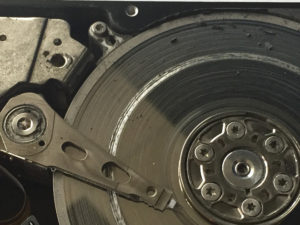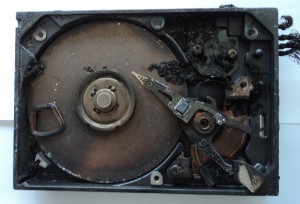
A hard drive badly burnt in a house fire.
In the vast majority of situations, data recovery is an option. Our technicians have recovered data from computers that have been in fires, floods, and hurricanes, and we’ve even restored files that were intentionally deleted by malicious actors — modern data recovery technology is incredible, and if you have a serious data loss scenario, a free media evaluation is certainly worth your time.
With that said, some severe situations can make data recovery impossible. Unrecoverable cases tend to fall under one of these categories:
Severe hard drive media damage – Hard drives hold data on platters, which consist of a glass, aluminum, or ceramic substrate disk and a thin layer of magnetic material. The magnetic material stores the actual data, and when it’s physically removed from the disk, the drive is unrecoverable.
Modern hard drives have numerous safeguards to prevent this, but if a drive operates in a failed state with its read/write heads in contact with its platters, extreme physical damage can occur. The drive pictured here ran for several hours in a failed state, but damage can also occur in a matter of seconds, depending on the extent of the failure.


Fires can also damage magnetic materials, and degaussing (removing the magnetic field that allows the hard drive to do its job) can also destroy data permanently. If your hard drive sustains fire damage, avoid handling it; contact a data recovery company right away for assistance.

That’s why our top piece of advice for clients is to turn off hard drives at the first sign of a physical issue. If you hear noises or if you’re seeing a large amount of corruption, you’ve probably sustained a hardware failure. To improve your data recovery prognosis, shut down the hard drive immediately. If necessary, unplug your computer from the wall — don’t worry about safe shutdown procedures. The longer a failed drive operates, the greater the chances of severe media damage.
Overwritten data – Deleting a file from a hard drive doesn’t immediately erase it; the drive typically marks the space occupied by the file as available, then overwrites that data at the next available opportunity.
Why? Well, if the hard drive immediately overwrote the data, the process would be far more intensive than necessary — the computer has no reason to immediately destroy the file, so it doesn’t spend the extra electricity and processing power. In most cases, data recovery engineers can recover deleted files, either in a partial or complete form.
The longer a computer runs, however, the higher the chances of a permanent overwrite. Computers constantly read and write data, so if you accidentally delete files, turn the device off right away. If you’re purposely trying to get rid of data in a secure manner, download a secure deletion program (we also offer secure deletion services, which can be cost effective for larger operations). Once files have been overwritten once, they’re only theoretically recoverable. When they’ve been overwritten more than once, they’re gone forever.
Deleted data on a solid-state drive – Solid-state drives work differently than HDDs, and when they delete data, they typically destroy it immediately. We’ll refrain from getting into the technical aspects of the process (we’ll have another blog about solid-state drives, garbage collection, and other cool stuff in the near future), but suffice to say, deleted files tend to be unrecoverable on SSDs.
Even if you believe that your case falls into one of these categories, your data might be recoverable. Other factors can affect recoverability in certain scenarios (for instance, data deleted from an SSD might exist elsewhere on the drive or in a cache, and physically damaged hard drives declared unrecoverable by one data recovery company might be recoverable with better equipment).
To get a quote or to discuss your case with a specialist, give us a call at 1-800-237-4200 or fill out our online form.




